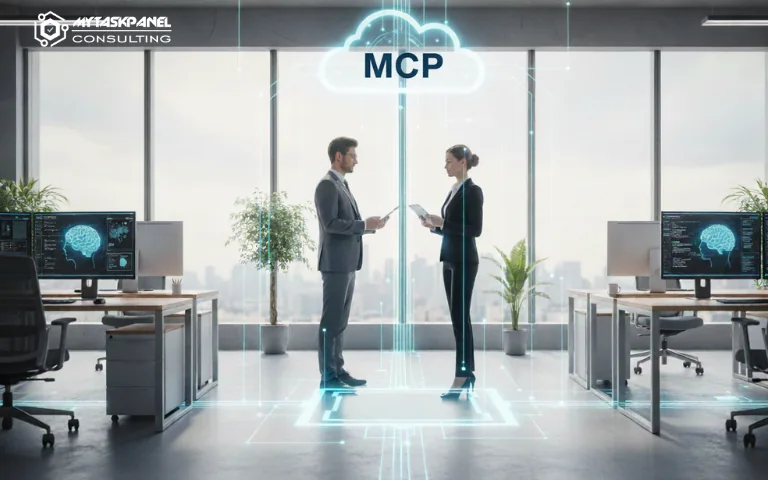Modern industry is undergoing an unprecedented digital transformation. The convergence between Operational Technology (OT) and Information Technology (IT) has placed at the center the need for more agile, standardized, and secure communications between machines, systems, and platforms. In this context, an innovation emerges that promises to redefine how industrial machines communicate: the MCP (Machine Communication Protocol). Unlike traditional industrial protocols, MCP has been designed with flexibility, interoperability, and direct integration into modern software environments in mind.
But what makes it different, and why is it said that it could change the future of industrial software? In this article, we explain what MCP is, its advantages, examples of application, and its potential impact on the industrial ecosystem.
What is the MCP protocol?
The MCP (Machine Communication Protocol) is a communication protocol designed to facilitate data exchange between machines, sensors, industrial devices, and software systems in a highly automated and distributed environment.
Its main objective is to enable standardized, flexible, and secure communication, eliminating the historical barriers between heterogeneous devices and diverse platforms within the industrial environment.
Origins and driving forces
MCP was created as part of the effort to modernize industrial automation systems, in line with initiatives such as Industry 4.0 and the Industrial Internet of Things (IIoT). Unlike older protocols such as Modbus or PROFIBUS, MCP is designed with a service-oriented architecture (SOA) and leverages modern technologies such as:
- JSON and XML for message structuring.
- HTTP/HTTPS and MQTT for secure and lightweight transport.
- TLS/SSL for encryption.
- RESTful APIs for integration with modern software systems.
In short, MCP is not just another machine-to-machine (M2M) protocol; it is a gateway to OT/IT convergence, allowing production data to integrate directly with ERP, SCADA, MES, cloud systems, and data analytics platforms.
Why can MCP change industrial software?
For decades, industrial software has been limited by proprietary protocols, closed environments, and low integration capacity. MCP breaks this paradigm by offering a more open, modular, and connected approach.
1. Standardization and openness
One of the biggest challenges in industrial software is interoperability. In a plant, you may find equipment from different manufacturers, each with its own protocol. MCP promotes unified communication, eliminating the need for custom-built integrations.
2. Direct integration with enterprise software systems
Thanks to its API-based architecture, MCP enables industrial software to connect natively with ERP, CRM, BI, dashboards, or cloud platforms without the need for complex gateways or translators.
Example: A machine can send production data directly to an SAP system or to a cloud database in Azure or AWS, in real time.
3. Reduced development and maintenance costs
Traditional industrial protocols are often costly due to their complexity, poor documentation, or limited support. MCP, being based on widely adopted technologies, drastically reduces integration, upgrade, and maintenance costs.
4. Security by design
MCP incorporates encryption and authentication by default—something many legacy protocols lack. This makes it ideal for environments where cybersecurity is critical, such as energy, pharmaceutical, or food industries.
5. Ready for real-time analytics
One of the greatest values of modern industrial software is the ability to analyze data in real time and make informed decisions. MCP, by facilitating structured continuous data flow, enables easier implementation of machine learning, predictive maintenance, or digital twin solutions.
Examples of MCP in Industrial Environments
Automated factory
An assembly line equipped with sensors and PLCs sends production data (performance, downtime, quality) via MCP to a MES (Manufacturing Execution System). In turn, the MES communicates with the company’s ERP, all in real time.
Predictive maintenance
A monitoring system uses MCP to send vibration, temperature, and pressure data from motors and pumps to a cloud analytics platform. The software identifies anomalies and generates alerts before failures occur.
Energy and utilities
A network of environmental monitoring stations in a chemical plant uses MCP to transmit critical variables such as gas levels, temperature, and pressure to the control center, complying with safety standards and regulations.
Integration with artificial intelligence
Through MCP, a computer vision system can receive sensor data and return instructions to a robot, adjusting its behavior in real time based on classification results.
MCP vs. other industrial protocols
Unlike traditional protocols such as Modbus, OPC UA, or MQTT, the MCP (Machine Communication Protocol) is specifically designed for modern, connected, service-oriented environments.
- Modbus is simple but limited and lacks native security.
- OPC UA is robust but complex to implement.
- MQTT is efficient for IoT but doesn’t define structures or operations.
MCP combines the best of each: clear data structures, easy integration via REST APIs, advanced security, and compatibility with cloud and IT environments.
In summary, MCP enables standardized, secure industrial communication that integrates directly with modern software, making it ideal for companies seeking agility, interoperability, and scalability in their processes.
The future of MCP and its impact on industry
MCP is set to become a key component in the industrial software architecture of the future. Its adoption will allow industrial companies to:
- Migrate to more agile, flexible, and scalable models.
- Harness the value of real-time data.
- Accelerate adoption of AI- and IoT-based solutions.
- Reduce dependency on proprietary systems.
- Integrate OT with IT seamlessly.
At MyTaskPanel Consulting, we believe that adopting open, modern technologies such as MCP can accelerate the digital transformation of industries, turning factories from isolated environments into intelligent, connected systems.
Conclusion: MCP, the bridge between traditional industry and intelligent software
The arrival of MCP marks a turning point in the development of industrial software. It’s no longer just about collecting data or automating machines—it’s about building an integrated, secure, and scalable ecosystem where data flows freely between devices, systems, and platforms.
At MyTaskPanel Consulting, we support industrial companies on this journey, helping them design custom solutions, develop IoT platforms, integrate legacy systems, and adopt disruptive technologies such as MCP.
Do you want to explore how the MCP protocol can transform your industrial operation? Contact us and we’ll help you take the next step toward the smart factory.

